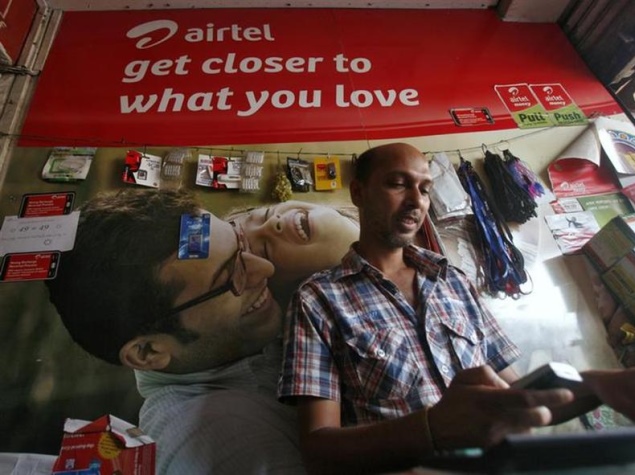- Home
- Telecom
- Telecom News
- Supreme court refuses to stay spectrum auction
Supreme court refuses to stay spectrum auction

However, in an extraordinary urgent hearing on Sunday, a bench comprising justices A R Dave and S A Bobde admitted the appeals filed by Airtel and Vodafone challenging the January 31 order of the Telecom Disputes Settlement and Appellate Tribunal (TDSAT).
"The appeal is admitted and hearing is expedited," the bench said after the Centre opposed the appeals saying "any observation from you (apex court) can scare away other bidders and can take away the vibrancy of the spectrum auction".
Senior advocates Mukul Rohatgi and Abhishekh Singhvi, appearing for Airtel and Vodafone respectively, contended that the existing licences for the spectrum to them should be extended instead of putting them on auction.
While Rohatgi submitted that the apex court should ask the telecom department not to declare the result of the auction till it decides the appeals, Singhvi contended that Vodafone was having the licence for 20 years since 1994, so it has the right over the spectrum and the licence should be extended for another 10 years.
However, the bench observed that "it does not mean that you should have a monopoly".
Telecom companies made arguments in the apex court identical to those before the tribunal saying they have made huge investments ranging into several crores of rupees and hence had the legitimate expectation for the extension.
Any such denial was "illegal and unreasonable," they said adding that it would also result in the discontinuance of service to its subscribers.
The TDSAT had rejected their plea saying "the petitioners have failed to establish their right for extension in terms of the relevant provisions in their licenses, the matter ends there".
The tribunal had held that it was satisfied with the reason based on which the Department of Telecom (DoT) had denied extension and had asked telcom companies to participate in the spectrum auction starting February 3.
"Denial of extension of the licenses to the petitioners is based on good reasons as envisaged under clause 4.1 of the UAS license and the relevant provision in the CMTS license and the petitioners can claim no right for extension of their licenses under the aforesaid provisions of their licenses," TDSAT had said in its order.
It had further observed that "any extension of the expiring licenses is bound to undermine the implementation of the policy and that is justification enough and sufficient for the Government to decline the extension for the licenses".
Vodafone and Bharti Airtel are participating in the coming auction and are short-listed as eligible bidders.
Their licences are expiring by November end this year on completion of the 20-year period as per license conditions.
However, their participation is without prejudice to their rights and contentions in the petitions pending before TDSAT as per the order passed December 20, 2013.
Loop, which operates in the Mumbai circle, has not participated in the auction process as it was waiting for the outcome of this petition.
Idea's seven licences would expire in December 2015.
Vodafone's licence is expiring for Delhi, Mumbai and Kolkata circles while for Airtel it is Delhi and Mumbai circles.
(Also see: Vodafone offers Rs. 4,000 crore for retaining 2G spectrum in three circles)
Airtel, Vodafone and Loop's spectrum belong to 900MHz band and a relatively very small portion to 1800MHz band.
However, tribunal was not impressed with it and had said: "We would only like to observe that the holder of a UAS license has no right of allocation of spectrum beyond 6.2MHz.
"As against that, all the petitioners have been holding, for years, spectrum far in excess of the contracted quantum and that too in the most premium band and that on payment of entry fee at rates fixed in 2001.
"Hence, we are not impressed by this submission".
The telecom operators have also contended that their mobile services may be discontinued and may result in a complete break-down of the mobile telephone service in the country and would leave hundreds of millions of their subscribers in the lurch.
However, the government had said that the consumer can change their operator under the Mobile Number Portability (MNP).
As per Trai's regulations, a subscriber can port to other operators within seven working days.
"We accept the averments made in the affidavit in the hope and trust that DoT has fully gone into the technological aspects of the transitional period and arrangements are in place to ensure that there is no dislocation in the mobile telephone service in the country," the tribunal had said.
Catch the latest from the Consumer Electronics Show on Gadgets 360, at our CES 2026 hub.
Related Stories
- Samsung Galaxy Unpacked 2025
- ChatGPT
- Redmi Note 14 Pro+
- iPhone 16
- Apple Vision Pro
- Oneplus 12
- OnePlus Nord CE 3 Lite 5G
- iPhone 13
- Xiaomi 14 Pro
- Oppo Find N3
- Tecno Spark Go (2023)
- Realme V30
- Best Phones Under 25000
- Samsung Galaxy S24 Series
- Cryptocurrency
- iQoo 12
- Samsung Galaxy S24 Ultra
- Giottus
- Samsung Galaxy Z Flip 5
- Apple 'Scary Fast'
- Housefull 5
- GoPro Hero 12 Black Review
- Invincible Season 2
- JioGlass
- HD Ready TV
- Laptop Under 50000
- Smartwatch Under 10000
- Latest Mobile Phones
- Compare Phones
- OPPO Reno 15 FS
- Red Magic 11 Air
- Honor Magic 8 RSR Porsche Design
- Honor Magic 8 Pro Air
- Infinix Note Edge
- Lava Blaze Duo 3
- Tecno Spark Go 3
- iQOO Z11 Turbo
- Lenovo Yoga Slim 7x (2025)
- Lenovo Yoga Slim 7a
- Lenovo Idea Tab Plus
- Realme Pad 3
- Moto Watch
- Garmin Quatix 8 Pro
- Haier H5E Series
- Acerpure Nitro Z Series 100-inch QLED TV
- Asus ROG Ally
- Nintendo Switch Lite
- Haier 1.6 Ton 5 Star Inverter Split AC (HSU19G-MZAID5BN-INV)
- Haier 1.6 Ton 5 Star Inverter Split AC (HSU19G-MZAIM5BN-INV)







![[Sponsored] Haier C90 OLED TV | Dolby Vision IQ, 144Hz OLED and Google TV in Action](https://www.gadgets360.com/static/mobile/images/spacer.png)









